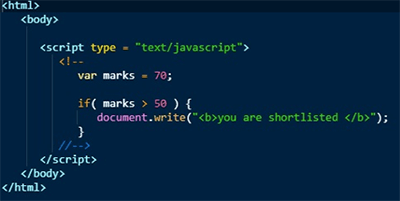

On examination, there fundamentally are four approaches to JavaScript conditional statements, which namely are: if:This conditional specifies a condition which triggers an action iffound to be true. So prefer v-show if you need to toggle something very often, and prefer v-if if the condition is unlikely to change at runtime. In JavaScript, conditional statements guide actions based on a specific true-or-false logic. Generally speaking, v-if has higher toggle costs while v-show has higher initial render costs. In comparison, v-show is much simpler - the element is always rendered regardless of initial condition, with CSS-based toggling. Logical operators are used to determine the logic between variables or values.

There are multiple different types of conditionals in JavaScript including: If statements: where if a condition is true it is used to specify execution for a block of code. V-if is also lazy: if the condition is false on initial render, it will not do anything - the conditional block won't be rendered until the condition becomes true for the first time. Conditional statements control behavior in JavaScript and determine whether or not pieces of code can run. V-if is "real" conditional rendering because it ensures that event listeners and child components inside the conditional block are properly destroyed and re-created during toggles. V-show doesn't support the element, nor does it work with v-else. The keyword if tells JavaScript to execute the code in the curly braces under certain conditions. However I would like to do something like: if (settings.The difference is that an element with v-show will always be rendered and remain in the DOM v-show only toggles the display CSS property of the element. If statements are used to make decisions in code. Then when creating the webpack config I can dynamically assign which file envsettings points to (i.e. Module.exports = Object.assign(all, require('envsettings')) Conditional statements are used to perform different actions based on different conditions. Example: const mymodule await import ('modulename') const foo fault // Default export const bar mymodule.bar // Named export. It returns a Promise that resolves to an object with the module exports.

`envsettings` is an alias resolved at build time. You can now call the import keyword as a function (i.e. Firstly to create a runtime config for an environment I have used resolve.alias to repoint a require depending on the environment, e.g: // All settings. In RequireJS you can pass a config in a plugin file and conditonally require things in based on that.įor webpack there doesn't seem to be a way of doing this. I have some things for development - e.g mocks which I would like to not bloat my distributed build file with.


 0 kommentar(er)
0 kommentar(er)
